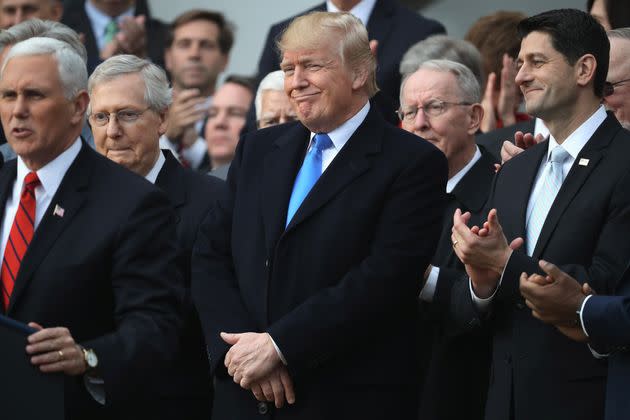White House Rips Trump’s Tax Cut Push: ‘Welfare For Big Corporations’
- Oops!Something went wrong.Please try again later.
- Oops!Something went wrong.Please try again later.

Senate Minority Leader Mitch McConnell, former President Donald Trump and former House Speaker Paul Ryan may have a lot of disagreements. But their presence at the signing of the Trump-backed 2017 tax law shows they all love one thing: cutting taxes for corporations.
The White House is sharply criticizing plans crafted by top advisers for former President Donald Trump to deeply cut taxes for U.S. corporations, setting the stage for a traditional clash over economic policy during the 2024 presidential election.
Some Trump advisers, according to plans discussed in a Washington Post report on Monday, would like to further push the tax cuts for the wealthy and corporations Republicans passed during Trump’s first term in office, potentially lowering the corporate tax rate from 21% to 15%. Before the 2017 tax law’s passage, the rate stood at 35%, and President Joe Biden has proposed increasing it to 28%.
Trump advisers are hoping to pay for the tax cuts with a massive 10% tariff on all imports to the United States, which would sharply increase prices for middle- and working-class Americans on a host of goods imported from around the world. It could also start a tit-for-tat global trade war.
While Republicans, including Trump, continue to tout a supposed focus on working-class Americans, the signature domestic policy achievement of each of the last two Republican presidencies was a highly regressive tax cut focused on corporations and the wealthiest Americans. Trump’s plan, which would likely face opposition from both congressional Democrats and Republicans, would mean the party continues to view tax cuts as its most important political goal.
“Another wave of deficit-increasing tax welfare for big corporations ― especially one directly tied to unprecedented price increases on American families ― would turn back the clock to the trickle down economics that hollowed out the American middle class and added trillions to the national debt,” White House spokesman Andrew Bates said. “The failed 2017 Trump tax giveway to rich special interests ballooned our deficits and didn’t help working families with higher growth, more jobs or higher wages. And unlike President Biden’s policies that are revitalizing American manufacturing, it did next to nothing to help America win the manufacturing industries of the future.”
The plans discussed by Trump advisers are not finalized and could change. “Trump has not yet committed to specific tax cut numbers for his second term agenda, and his focus will be on how best to help American workers,” Trump campaign spokesman Jason Miller told the Post. “Stay tuned.”
Among the proposals discussed in the Post report is using money raised by the tariff to send a dividend check to Americans, in theory decreasing the impact on lower-income workers.
Democrats on Monday appeared eager to relitigate a traditional fight over economic policy. President Barack Obama won reelection in 2012 in no small part due to his successful attacks on then-GOP presidential nominee Mitt Romney’s tax cut proposals, which were slanted towards the wealthiest Americans.
“Donald Trump is plotting to bring back the failed, trickle-down policies of his first term that lined the pockets of his ultra-wealthy friends and created incentives for corporations to ship American jobs overseas,” Biden campaign spokesman Ammar Moussa said. “This is the story of the Trump economy — blowing up the deficit to help out his wealthy friends at the expense of hardworking Americans and their families.”
A corporate tax cut would be politically unpopular: 61% of Americans said they were bothered “a lot” by corporations not paying their fair share of taxes in a poll earlier this year from the Pew Research Center. Two-thirds of Americans in the survey said taxes on corporations should be increased, including 45% of Republicans.
And no matter what Trump and his advisers cook up, passing his plans into law could prove difficult. Many congressional Republicans, especially in the Senate, are still loyal to the GOP’s historical orthodox support for free trade. And it’s unclear if the business community, which lobbied heavily for the 2017 tax cut, would be as interested in a second round of slashes as opposed to consistency.
“My general view is that prioritizing corporate tax cuts right now should not be the focus of American tax policy,” Sen. J.D. Vance (R-Ohio), a Trump backer who has populist tendencies, told HuffPost on Monday.
Both Trump and Biden have promised to upend at least part of the prevailing economic policy agenda of the last 40 years, one defined by free-trade and the belief upper-income tax cuts would “trickle down” to typical Americans. Biden’s plan, which he has struggled to sell to the public, focuses on using government subsidies to revitalize American manufacturing while boosting the power of working-class Americans to negotiate for pay raises.
Igor Bobic contributed reporting.
